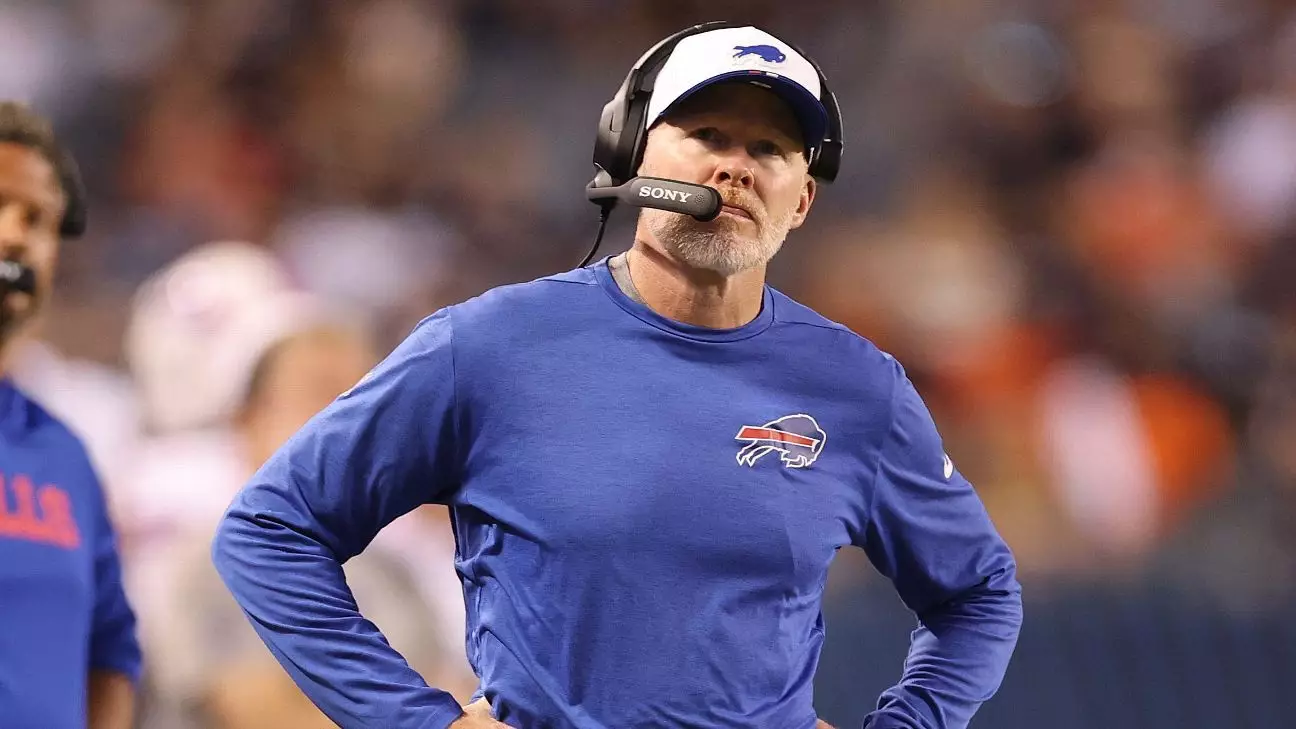The recent 38-0 drubbing at the hands of the Chicago Bears during preseason action laid bare some uncomfortable truths about the Buffalo Bills’ current state of preparedness. Coach Sean McDermott’s candid acknowledgment that the team was “certainly not up to our standard” underscores the severity of the issues at hand. Such a humiliating scoreline isn’t just a reflection of poor execution; it exposes underlying deficiencies that could jeopardize their chances in the upcoming regular season. The appearance of systemic problems—particularly on defense and special teams—casts doubts over whether the Bills have adequately addressed their weaknesses during training camp.
One glaring concern is the defensive collapse against Caleb Williams, a rookie quarterback who, despite limited experience, demonstrated poise and precision. Outgained 528-180 in total yards, the Bills’ defense was unable to muster any resistance, leading to a lengthy, demoralizing game that revealed significant gaps in coverage, tackling, and strategic discipline. This performance raises questions about the team’s ability to handle high-caliber opponents once the season commences. The inability to adapt or rally in the face of adversity signals that there is a substantial amount of work needed—far beyond the basics—to elevate the defense to a competitive level.
Performance of Backup Corps and Lack of Consistency
While McDermott prioritized resting key starters like Josh Allen, the performance of the backups was noticeably underwhelming. The fact that the second and third stringers couldn’t contain Chicago’s first-string offense, let alone compete fiercely against them, exposes a depth issue that cannot be ignored. This lack of consistency across the roster suggests that the pipeline of emerging talent isn’t quite ready to step into critical roles, nor do the current backups inspire confidence. The lacunae in performance are not merely technical; they reflect a need for sharper coaching, more rigorous training, and perhaps a reevaluation of player development pathways.
Moreover, the Bills’ special teams and penalty discipline further compounded their woes. Penalties—totaling ten—highlight a lack of focus and mental composure. These mistakes, though small on a play-by-play basis, collectively can influence game outcomes and foster a sense of instability within the squad. Such fundamental lapses are easy to dismiss in preseason, but they often carry over into regular-season struggles if not rectified promptly. The coaching staff must hence emphasize discipline and fundamental football to build a resilient, unified team.
Offensive Performance and the Challenge of Building Consistency
Caleb Williams’ impressive debut with the Bears demonstrated the importance of developing a mentally tough and technically refined quarterback. His ability to execute under pressure and lead Chicago on a 92-yard scoring drive was a stark contrast to the Bills’ offensive struggles. McDermott’s remark that Williams was “unaffected” and in a “rhythm right away” reveals that the Bills’ defense was ill-prepared to handle such composure and athleticism.
The offense, meanwhile, was largely on the sidelines during this debacle, a choice rooted in health preservation. Nevertheless, the limited opportunities to evaluate the team’s offensive cohesion leave lingering doubts. The preseason, after all, serves as a barometer for how well the offensive line protections, route combinations, and play-calling are meshing. The lack of offensive innovation or execution during these experiments can be a warning signal that the team may struggle to generate consistent scoring under real-game pressures.
Urgent Need for Reflection and Adjustment
McDermott’s acknowledgment that “there’s a lot to get cleaned up” indicates a coaching staff aware of the storm ahead. The early-season jitteriness and fundamental errors are problems that can be addressed, but delay in doing so risks watching what should be a promising campaign turn into a season marred by avoidable mistakes. The focus now must shift towards sharpening techniques, reinforcing discipline, and fostering mental resilience. If the Bills do not rectify their deficiencies quickly, their lofty aspirations of competing in the AFC East and beyond may be compromised before the games even count.
This loss, while only preseason, should serve as a wake-up call—an unmistakable sign that complacency has no place in a league where every mistake can be exploited. The Bills’ challenge is not merely technical but psychological: to instill confidence, to hone their fundamentals, and to forge a resilient team capable of rising from setbacks. The forthcoming weeks are critical, and the team’s response to this embarrassing defeat could very well define their season’s trajectory.


Leave a Reply